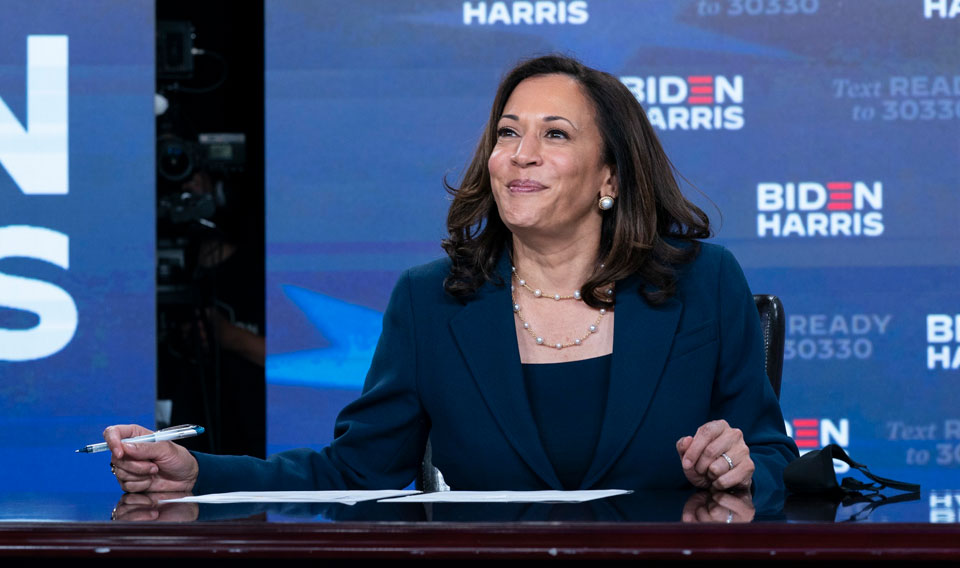
WASHINGTON—In its first legislative test on a pro-worker cause since the Democrats narrowly took control, the Senate split 50-50 on partisan lines on whether to raise the federal minimum wage to $15 an hour by 2025. With Vice President Kamala Harris breaking the tie, the wage hike stays in the budget blueprint being advanced by the Democrats.
All 50 Republicans, led by Joni Ernst, R-Iowa, voted for her motion to kill the hike and all 48 Democrats and both independents voted to keep it. The tie defeated her anti-minimum wage hike scheme.
So the minimum wage increase stayed in the budget blueprint/resolution which Senate Democrats—with Vice President Kamala Harris’s vote, #51, breaking the tie–pushed through after midnight on Feb. 5. The resolution clears the way for later passage of Democratic President Joe Biden’s $1.9 trillion American Recovery Act through a process called “reconciliation,” which the GOP can’t filibuster.
Later that day, the Democratic-run House accepted the Senate’s budget blueprint, also on a virtual party-line vote. Biden and organized labor can now push the recovery act, the economic aid bill to help pull the U.S. out of the depression created by coronavirus pandemic-caused closures from coast to coast.
“I support passing COVID [coronavirus] relief with support from Republicans if we can get it,” Biden said before the Senate vote. “But COVID relief has to pass. There’s no ifs, ands, or buts.”
“We have learned from past crises: The risk is not doing too much; the risk is not doing enough.”
That “reconciliation” bill includes raising the wage, and Rep. Ilhan Omar., DFL-Minn., told Our Revolution on Feb. 8 that the House Education and Labor Committee would include the minimum wage hike in its part of reconciliation at a Feb. 9 work session.
The minimum wage hike would double the current federal minimum wage of $7.25 an hour. It hasn’t risen in 12 years. The Economic Policy Institute calculates the increase would put $3,300 in the pockets of each of 32 million workers—22% of the U.S. workforce.
Senate Budget Committee Chairman Bernie Sanders, Ind-Vt., led the charge for keeping the minimum wage, and other pro-worker measures, in the reconciliation bill—and thus alive for the estimated 32 million low-wage workers who would benefit.
“Passing this budget resolution will give us the tools we need to raise the minimum wage to a living wage of $15 an hour, expand unemployment benefits, expand the child tax credit, and prevent eviction, homelessness, and hunger,” Sanders told his colleagues at the start of two days of debate.
“Passing this budget resolution means that during this raging pandemic, we will be able to provide healthcare to millions of Americans who are uninsured and underinsured by expanding Medicaid, improving the Affordable Care Act, and other approaches.” And it will also add $1,400 in one-time checks to every adult, on top of $600 each is supposed to get from a coronavirus economic aid bill approved in December.
“We cannot continue to allow workers in America to work at jobs that pay them a starvation wage,” Sanders continued. “A United States of America job should lift you out of poverty and not keep you in it.”
“So let us be clear: When we increase that minimum wage to $15 an hour, not only will we be providing a much needed raise for tens of millions of American workers, we will also, by the way, save taxpayers many billions of dollars each and every year” in benefits—housing subsidies, food stamps, temporary assistance to needy families and more—he explained.
The budget resolution also clears the way to allot money for renters and homeowners to prevent evictions beyond March 31, to keep their utilities going, and to expand Medicaid so the nation’s millions of jobless workers who also lost their health insurance can get health care, Sanders said.
And it forecasts sending $350 billion to state and local governments after their tax revenues tanked due to coronavirus-caused closures, and they had to lay off 1.4 million workers, and counting, he added. That aid is a key goal of AFSCME and other unions and drew GOP howls about “subsidizing” blue states.
But in line with two recent rulings by the Supreme Court’s GOP-named majority, the budget blueprint said states that use the coronavirus to impose more restrictions on attendance at religious services than they do on businesses could see their money cut. And in a sop to the right, the budget blueprint endorsed future funding of security and other costs for keeping the U.S. Embassy in Israel in Jerusalem.
Catering to the U.S. religious right, ultra-Orthodox Jews and his pal, right-wing Israeli Prime Minister Benjamin Netanyahu, former GOP Oval Office occupant Donald Trump moved the embassy from Tel Aviv, thus throwing the U.S. out of its “honest broker” role in the long-stalled Israeli-Palestinian peace process.
The Republicans, as usual, complained that raising the wage for the nation’s lowest-paid workers would drive businesses out of business, despite many studies showing that’s a longtime corporate lie.
“If we want there to be jobs left for workers to go to, both during and after this pandemic, a huge spike in a federal minimum wage is simply unsustainable,” Ernst wrote in a recent op-ed for Iowa newspapers. “Instead, we should provide targeted relief to families and businesses and facilitate an economic recovery across our state and country. Increasing the federal minimum wage right now does just the opposite.”










